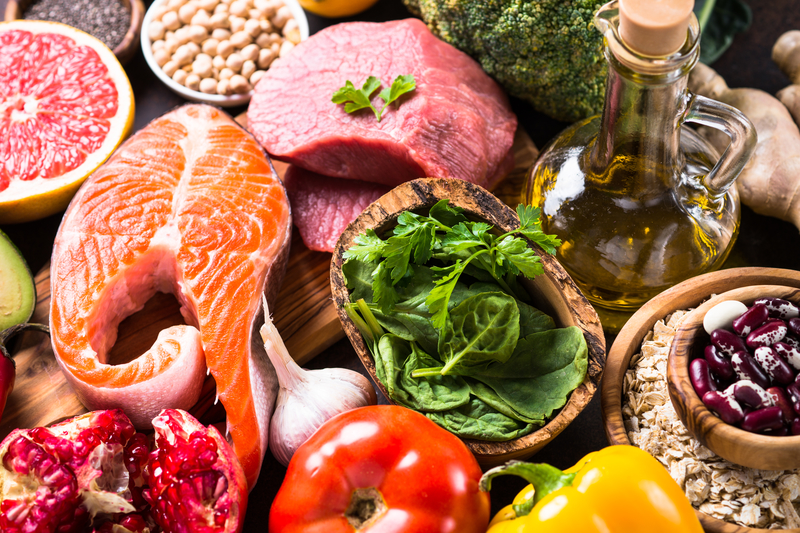With so much talk about how protein, fat, and carbohydrates affect your health, discussion about other nutrients has been on the back burner. Eating a real, balanced diet means you shouldn’t have to worry about getting enough vitamins and minerals, right? Not so fast!
Macronutrients — the trio of carbohydrates, fat, and protein that meet most of your metabolic needs are important — but micronutrients, the vitamins and minerals you need only in small amounts, are critical for every chemical function in your body. They have a profound effect on how efficiently macronutrients are utilized, so without sufficient amounts of them in your diet, your macronutrient intake will be lower than it should be.
There are only two ways to meet your vitamin and mineral needs — a nutrient-rich diet or a good quality vitamin and mineral supplement. Micronutrients are easy to make in a lab, but many work best when combined with other elements in food. A supplement is a good way to hedge your bet, but nothing beats the nutrition of a colorful diet full of fruits and vegetables.
When it comes to healthy eating, it’s easy to focus on the negative — the things you shouldn’t be eating, but if you’re ready to focus on the positive, these are the top 10 nutrients you may be neglecting.
Iron
Iron is the ultimate feel-good mineral. It helps your muscles use and store oxygen. The best sources of iron are found in lean meats like beef, turkey, and chicken. Vegetables and legumes like spinach and kidney beans have a lot of iron, but less than half of it is absorbed by the body. If you depend on plant sources for iron, eating it with foods that are also rich in vitamin C aids absorption.
Folic Acid
Folic acid is a B-vitamin used by the body to make nucleic acid, a vital building block for all new cells. It’s especially important for pregnant women to prevent fetal birth defects. In 1998 a rise in spina bifida and other neural tube defects in infants forced the U.S. Food and Drug Administration to begin mandating the fortification of popular grain products such as flour and pasta. The U.S. Centers for Disease Control and Prevention recommend at least 400 milligrams daily for women of childbearing age. Good natural sources include beef, green leafy vegetables, lentils, and rice.
Magnesium
Magnesium is needed for nearly every chemical reaction in the body. It supports heart, nerve, and muscle function. True deficiency is considered rare, yet studies suggest that as many as three-quarter of Americans aren’t getting enough. This is in part due to the high intake of foods that lose magnesium during processing. Beans, nuts, and whole grain bread are excellent sources.
Potassium
Potassium is a critical electrolyte that keeps your body’s fluid balance within a normal range. Without it, your nerves and muscles, including the heart, couldn’t communicate. Sports drinks with potassium are the choice of many professional athletes looking for a fast way to stay hydrated and ease muscle cramps, but for the rest of us, the best sources are sweet potatoes, bananas, orange juice and yogurt.
Calcium
Calcium is well-known for strengthening bones and teeth, but it’s also an important neurotransmitter that helps regulate the contraction and relaxation of muscles, including the heart. Adults need an average of 1,000 milligrams of calcium each day. The best sources of calcium include dairy products such as milk and yogurt, but it can also be found in nuts, salmon and enriched cereal and juices.
Vitamin A
There are two types of vitamin A — retinol, an active form from animal products that is critical for eye health and beta-carotene, a form from plants that works to destroy harmful cells in the body called free radicals. If you’re eating five servings of fruits and vegetables every day, you are getting more than half the recommended daily allowance of Vitamin A. Other good sources include liver, eggs and whole milk.
Vitamin B12
Vitamin B12, also known as cobalamin, plays an essential role in the functioning of the brain and nervous system as well as the formation of healthy red blood cells and the production of energy. Thankfully, the body stores B12 because it’s naturally present in few foods. Most vitamin B12 is found in meat and dairy products. Plant-sourced vitamin B12 is not absorbed by the body, but vegans can meet their needs with supplements or fortified foods.
Vitamin C
Vitamin C is necessary for the building and repair of every tissue in your body. It supports the function of your immune system and is the main ingredient in most over-the-counter medicines used to prevent colds. Vitamin C shows promise in many studies for preventing heart disease, stroke, and some cancers. The best sources of vitamin C are fruits like cantaloupe and oranges and vegetables including broccoli and green peppers.
Vitamin D
Known as the sunshine vitamin, your body produces its own supply of vitamin D when it’s exposed to sunlight, but it’s estimated that most adults aren’t making enough. Getting more sun is one solution, but the risk of skin cancer is high. Since studies suggest the benefits of vitamin D far exceed healthy bones, getting enough is important, but it’s tough to find in food. To get the recommended daily intake of 600 to 800 IUs daily, you’ll need to turn to fatty fish like salmon or eat plenty of foods fortified with vitamin D like milk.
Vitamin E
Vitamin E is a powerful antioxidant that slows down inflammatory damage done to the body by free radicals, cells the body produces in response to stress. Vitamin E is found in nuts, fish, green leafy vegetables, whole grains, legumes and vegetable oils.
The key to getting enough micronutrients is to eat a diet that includes a wide range of fruits and vegetables as well as balanced amounts of lean meats and fortified foods. Mother Nature’s way is best, but if you’d rather leave the veggies for the rabbits, a high-quality micronutrient supplement may be a good insurance policy.
References:
The Alzheimer’s Diet – Improve Memory With Brain Healthy Foods
https://ods.od.nih.gov/factsheets/Iron-HealthProfessional/
https://agresearchmag.ars.usda.gov/1997/jun/folate
https://www.cdc.gov/ncbddd/folicacid/about.html
http://www.proactivenutrition.net/2010/08/18/electrolytes-can-charge-athletic-performance/
https://ods.od.nih.gov/factsheets/Calcium-HealthProfessional/
https://www.smore.com/7ky69-rapid-tone-diet-this-is-shocking
https://www.webmd.com/diet/features/the-benefits-of-vitamin-c#1
https://www.webmd.com/diet/guide/vitamin-d-deficiency#1
https://www.healthline.com/nutrition/foods-high-in-vitamin-e
- Top 10 AI Tools for Time Management in 2025: Boost Productivity and Reclaim Your Time - October 10, 2025
- The Sixth Sense: Signs You’re More Intuitive Than You Think - August 28, 2023
- Unpacking the Phrase: The Deep Meaning of ‘She Distanced Herself to Save Herself - August 2, 2023


